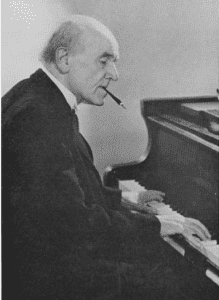Michael Yafi
Houston, Texas, United States
 |
|
Nikolai Medtner recording for HMV, 1947. Photographer unknown, copyright controlled, courtesy of Warner Classics.
|
The music of Nikolai Medtner (1880 -1951) is among the most enigmatic of the piano repertoire.
Medtner was an opinionated composer who admired Rachmaninoff and rejected all attempts at modernism in music. Rachmaninoff met Medtner in Russia and the two composers had a mutual admiration for one another. Rachmaninoff told Medtner when he sponsored his tour of the US: “I repeat what I said to you back in Russia: you are, in my opinion, the greatest composer of our time.”
Medtner not only disliked modernism in music, but also could not tolerate contemporary composers who were exploring it. After attending a performance by Prokofiev in Russia, he famously said, “if this is music then I am no musician.”1
Medtner resisted modernism through his own compositions and by writing a book sponsored by Rachmaninoff. In The Muse and the Fashion, Medtner explains the “sacred elements” of the organic structure of harmonic system, voice, cadence, and lyricism and their roles in forming music. Then he moves on to criticize all modernism attempts in music and art.2
His music is complex, detailed, often long, and requires constant attention from listeners. It is also virtuosic and technically demanding to play.
Medtner called two composition series “Forgotten Melodies.” The melodies are initially lyrical and beautiful but then get lost within the structure of the composition as it becomes more complex. Fragments of these melodies surface again and again, within the same piece or throughout the other pieces in the cycle.
Another supporter of Medtner was the Maharaja of Mysore, an Indian royal philanthropist who loved Medtner’s music and sponsored him to record his compositions.
After touring Europe and the US, Medtner settled in England. He continued performing and composing. Medtner was a smoker (famous for smoking just half a cigarette each time),3 and suffered heart attacks in 1942 and 1948. Feeling weak and tired, he insisted on completing the recording of his three piano concertos. Some music critics have noted the composer’s fatigue in these performances.
Medtner told his wife before his death in 1951: “You know, my fingers can play but my heart can do no more; it is as if I have a mountain to lift up.”1
References:
- Martyn, B. Nicholas Medtner: his life and music. Routledge, 2016.
- Swan, A. J. (1922). Medtner. The Musical Times, 63(955), 616–619. https://doi.org/10.2307/912214.
- Chisholm, E. Men and music: Nikoli Medtner. http://www.erikchisholm.com/menandmusic/medtner.php.
MICHAEL YAFI, M.D., is a Professor and Director for The Division of Pediatric Endocrinology at UTHealth (The University of Texas Health Science Center at Houston).

Leave a Reply